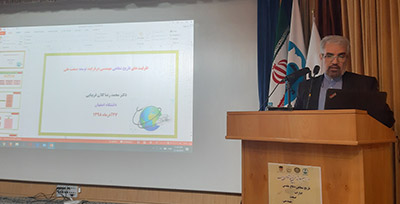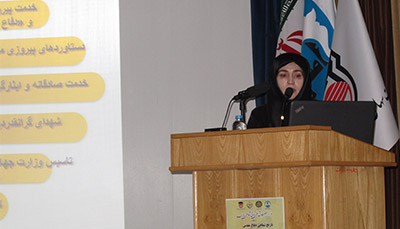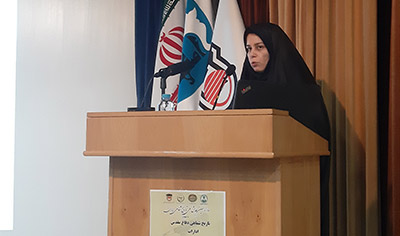The 2nd part of the “12th Conference on Iranian Oral History”
Slumber of organizations active in war in area of oral history
Maryam Assadi jafari
Translated by M. B. Khoshnevisan
2020-1-8
In an article titled “Oral History of War Department of Ministries and Headquarters of Supporting Front in State Organizations; Policies and Approaches”, Peimaneh Salehi has concluded that in general, we have no organization whose activities in the field of supporting the fronts are released or the topics are presented both through written resources and through oral history in a concentrated way. There are still many areas in popular narrations and the members of government to which should be paid attention. This information can indirectly visualize the mental and emotional image of war.
According to the website of Oral History, “The 12th Nationwide Conference on Iranian Oral History” with the aim of “explaining about relevance and necessity, recognizing the role and recovery of oral history priorities in the area of Jihad Sazandegi (holy war of construction), industry, engineering and logistics in Scared Defense” was held in Saeb Hall of the Literature and Humanities College of Isfahan University on 18th of December 2019. It was organized by Association of Iranian Oral History, Isfahan University, the Office of Veterans Affairs, the Ministry of Jihad of Construction, and Isfahan Steel Company.
Widespread human forces; one of the capacities of oral history
The second part of the conference started by unveiling the released works in the area of oral history and Mahmoud Najafi, Dr. Morteza Massah, Dr. Morteza Raouli Pour, Ramezan Ali Kavoosi and Dr. Asghar Montazer Gha’em presented short explanations about their works.

Then, “Dr. Morteza Dehqan Nejad”, “Dr. Mohammad Ali Chelongar” and “Hojjatoleslam Saeed Fakhr Zadeh” chaired the meeting and “Dr. Mohammad Reza Kalan Faribaee” presented his article entitled “Fields, Subjects and Necessities of Oral History of Industry, Engineering and Sacred Defense Logistics” and said, “First we want to see how the impact of capacity of oral history of engineering with the approach of reproducing the discourse of Jihad has an impact on the development of national industry. If we institutionalize the discourse conception in this debate, the great capacities of the past will be applied with a look at future research and the notion of futurism. It is grateful that the trench-less trench builders have served the country in the past so that today, oral history is seeking to revive this talent for the future of the country. Discourse conception helps to use social science methods and interdisciplinary attitudes to express memories. Iranian society cannot be governed by a single discipline, and a multi-disciplinary approach can certainly govern the society in a desirable manner. A concentrated structure in the development of national industries is an important necessity that we emphasize in the discourse conception. It is important for us to look at human experience in the past, the scientific and global perspective, and to pay attention to paradigmatic trends. If we pay attention to paradigmatic attitudes, we will not get caught up in groups and factions. Extensive human resource is one of the capacities of oral history. This extensive human resource in oral history is used in the development of the national industry and addresses experts, expresses and informs their views on the necessity and patterns of development. The second capacity is the broad subject area of oral history. Today we can involve in oral history issues that never existed before. For example, technology, the Internet and social networks help us develop the country. The third capacity is the presence of women community. The community of women with outstanding abilities in the fields of science, industry, and construction is present in oral history that can be used. The next important point is that we have a generation gap that can be filled with oral history and create a relationship between the past and the new generation. The trench-less trench builders belonged to a previous generation who played a historic role in the eight-year sacred defense and now complain about why the new generation cannot understand the value of these materials. We must convince them through constructive dialogue and transferring of useful information and data to the new generation. There are many documentations and views in oral history which are seen nowhere else. We made a jihad during the war, but we neglected the principle of jihad in peace and did not record these sacrifices.”

In continuation, “Dr. Samaneh Lajevardi explained about her article titled "Explaining the Social Backgrounds and Conditions of Forming Jihad of Construction. She said, "Historiography and chronology is a tool for regulating our perception. This vital tool is important for strategic planning. Explaining the establishment of jihad of construction can have an impact on future human capital. The pride of Jihad of Construction is that it is the first spontaneous revolutionary institution and its merger with Jihad of Construction should not cause their goals such as eradication of poverty and their function in fronts.”
Oral history; an introduction to management of knowledge
The third article titled “Oral History of War Department of Ministries and Headquarters of Supporting Front in State Organizations” was presented by Peimaneh Salehi. She said, “In general, we have no organization whose activities in the field of supporting the fronts are released or the topics are presented both through written resources and through oral history in a concentrated way. Oral history interviews are a type of historical researches that starts with questions about the past events; that group of the events whose witnesses and operators are still alive. The oral history research goes ahead through interpreting the quotations of the witnesses and operators of that event. Oral historians look at the benefits of oral history with two main approaches. One of these approaches is to find new information especially the information neglected in history. The second approach is also to research about the past events and the obtained findings under the heading “Oral Documents”. If oral history is done correctly from the beginning to the end correctly on the basis of the raised questions, new evidences are emerged and a comprehensive and multilateral understanding of events will be possible. Interviews and oral histories are both a kind of oral connection and seek to discover the reality. However, in an oral history interview, there is a joint issue between the interviewee and interviewer for discovering the reality.

War is one of the oldest subjects of the mankind. When a war is terminated, there remains evidence that guides researchers to its hidden layers. One of the themes of sacred defense is to address the narrations of government managers, officials, and experts during the war years. In this article, I have tried to provide a summary of the current situation, in light of written documents and few interviews with various ministries. I also haven't focused on a particular ministry to see where the oral history activities can be done.
I have a sample of questions in the article. I have mentioned topics and headings so that we can examine the activities of every ministry during the sacred defense period in the future.
Regarding the registration of the policies of ministries and organizations during the sacred defense, we can refer to the planning and supervision concerning the dispatching of forces to the war fronts. After the breakout of the war, the war department was established in all of the ministries under the supervision of the related minister. This department from the very beginning took useful and effective steps in helping the front and then the people during the bombardment of residential areas. In addition to the planning of the war department of the ministries, the Basij bases in the offices and organizations resorted to train and send forces. Also, in order not to disrupt the specialized activities of each ministry, all the forces working in the sector were not sent to the fronts. Even, it was seen in oral history interviews and written documents that when the managers were dispatched to the war fronts, they were assessing which women were appropriate to manage that ministry, and they were used. The sending of machines and equipment to the front is another point that should be registered and recorded through oral history and written documents. Managers and experts identified the needed items based on requests received from the fronts. The answers to these questions have been neglected. Which experts were involved in identifying the needs of the front? How was the necessary cooperation with the administrative departments and what backgrounds were carried out in this regard? Which organizations and institutions did the most collaboration? Was there a budget for the purchase of equipment by the president?
The next issue is technical support for the fronts. The sending of the equipment and weapons were certainly not useful without dispatching committed and efficient specialists. Ministries were sending technical experts in accordance with their specialized activities. The Ministry of Petroleum, the Ministry of Energy, and the Ministry of Post, Telegraph and Telephone had a key role comparing to other ministries, and they carried out many activities in the field of technical support to the fronts, which unfortunately no independent research has been carried out in this regard.
The recording of the attitude of the managers of organizations after the breakout of the war in the area of oral history is also important. “The Central Headquarters of Supporting Fronts” was set up in the presidential institution. Each of the provinces had set up a spate headquarters in the governorates which supported the fronts in coordination with the attitudes of the authorities in the central headquarters. In addition to backing human forces and the dispatch of equipment, the headquarters was also responsible for protecting the people’s security in the cities and residential areas. The war department of the ministries also felt responsible for ensuring the staff security of the civilian area. Documenting the authorities' attitudes in this field will open up new areas for researchers with the help of oral history. For example, the establishment of many shelters, many of which were built by government agencies. The Interior Ministry had built a shelter used by the people during the missile bombardments. In this regard, such questions can be asked, “What was their main policy in building such a shelter? What countries did they use in their war experience? What was the right place to build a shelter? Which organizations have been the most active in this field? And what are the memories of those who went to the shelter? What measures were taken to keep shelters safe when in use? "
We can turn the available information in the individuals’ minds into written knowledge by using oral history. Oral history can be an introduction to management of knowledge. These questions can be asked from the retirees of different organization who have been present at that time, and more materials cane be produced. The reviewing of the viewpoints of the members of the government family about the war period is of great importance. In fact, the sacred defense era is not just the registering and recording of the commanders and combatants. The people’s memoirs and information about the war and the role of government agencies during the war is one of the roles that have been neglected. The difference of the status of government agencies which has caused them not to be present in the fronts is that they have been seen less. But supporting the fronts can produce a new narration which supplements the combatants’ narrations. The next issue is the headquarters for dealing with war-torn affairs. The Foundation for Affairs of Migrants of the Imposed War is one of the government agencies that was later established under the Interior Ministry to assist and meet the needs of war refugees, which was responsible for overseeing welfare, housing, and education programs. In this respect, we also have no coherent research work on whether the Foundation for War-Torn Affairs could achieve its intended goals by the end and after the war?
The next lesser discussed topic is the cultural and artistic activities carried out by the Ministry of Guidance and some organizations during the war. When we read the warrior memories, we find that these activities have had a great impact on the combatant's morale. There are still many areas in popular narrations and family members of the government that need to be taken into account which this information can indirectly visualize the mental and emotional image of war.
“The 12th Nationwide Conference on Iranian Oral History” with the aim of “explaining about relevance and necessity, recognizing the role and recovery of oral history priorities in the area of Jihad Sazandegi (holy war of construction), industry, engineering and logistics in Scared Defense” was held in Saeb Hall of the Literature and Humanities College of Isfahan University on 18th of December 2019. It was organized by Association of Iranian Oral History, Isfahan University, the Office of Veterans Affairs, the Ministry of Jihad of Construction, and Isfahan Steel Company.
To be continued...
Report of “the 12th National Conference of Iranian Oral History”-Part 1
Number of Visits: 2299








The latest
Most visited
The Arab People Committee
Another event that happened in Khuzestan Province and I followed up was the Arab People Committee. One day, we were informed that the Arabs had set up a committee special for themselves. At that time, I had less information about the Arab People , but knew well that dividing the people into Arab and non-Arab was a harmful measure.Kak-e Khak
The book “Kak-e Khak” is the narration of Mohammad Reza Ahmadi (Haj Habib), a commander in Kurdistan fronts. It has been published by Sarv-e Sorkh Publications in 500 copies in spring of 1400 (2022) and in 574 pages. Fatemeh Ghanbari has edited the book and the interview was conducted with the cooperation of Hossein Zahmatkesh.Is oral history the words of people who have not been seen?
Some are of the view that oral history is useful because it is the words of people who have not been seen. It is meant by people who have not been seen, those who have not had any title or position. If we look at oral history from this point of view, it will be objected why the oral memories of famous people such as revolutionary leaders or war commanders are compiled.Daily Notes of a Mother
Memories of Ashraf-al Sadat SistaniThey bring Javad's body in front of the house. His mother comes forward and says to lay him down and recite Ziarat Warith. His uncle recites Ziarat and then tells take him to the mosque which is in the middle of the street and pray the funeral prayer (Ṣalāt al-Janāzah) so that those who do not know what the funeral prayer is to learn it.


